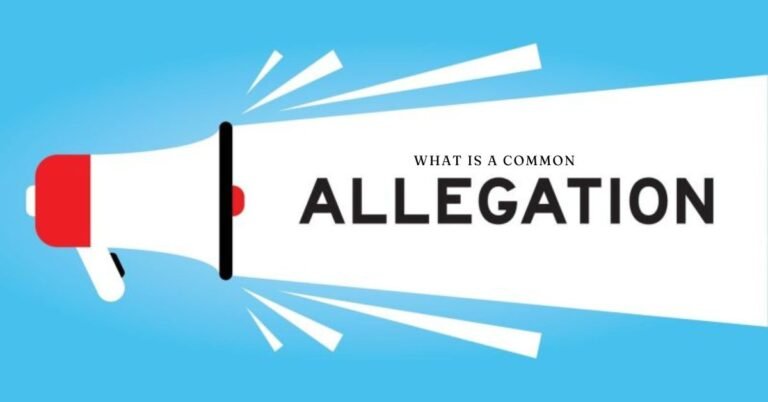Introduction
In legal and business contexts, allegations play a crucial role in determining accountability and justice. But what is a common allegation? Simply put, it is a frequently made claim or accusation against an individual, entity, or organization, often relating to legal, ethical, or professional misconduct. Allegations can range from fraud and harassment to negligence and breach of contract. While an allegation does not equate to guilt, it can have serious repercussions, including reputational damage and legal consequences.
Understanding common allegations is essential, whether you’re a business owner, an employee, or a legal professional. This article delves into the most frequent types of allegations, their impact, and how individuals and organizations can effectively respond to them.
Understanding Allegations: Definition and Legal Perspective
An allegation refers to an assertion or claim that someone has engaged in wrongdoing, but it is not yet proven in a court of law. Allegations can arise in various situations, including workplace disputes, criminal cases, business disagreements, and political scandals. While some allegations may be baseless or exaggerated, others hold merit and require thorough investigation.
From a legal perspective, allegations must be supported by evidence to progress into formal charges or lawsuits. The principle of “innocent until proven guilty” ensures that accused parties are given a fair chance to defend themselves. However, in today’s digital age, even an unverified allegation can lead to public backlash, emphasizing the importance of understanding how allegations work and their potential consequences.
Common Types of Allegations in Different Sectors
1. Workplace Allegations: Discrimination, Harassment, and Wrongful Termination
In professional environments, allegations often revolve around workplace ethics and employee rights. Some of the most common allegations include:
- Discrimination: Claims of bias based on race, gender, age, disability, or other protected characteristics.
- Harassment: Unwanted behavior that creates a hostile work environment, including sexual harassment.
- Wrongful Termination: Accusations of being fired for unjust or unlawful reasons, such as retaliation or discrimination.
Organizations must establish clear policies and proper reporting mechanisms to handle such allegations effectively. Failure to address workplace allegations can lead to lawsuits, reputational damage, and decreased employee morale.
2. Criminal Allegations: Fraud, Theft, and Assault
Criminal allegations are serious claims that can lead to legal action, imprisonment, or financial penalties. Some prevalent examples include:
- Fraud: Deception intended to result in financial or personal gain, such as identity theft or securities fraud.
- Theft: Unlawful taking of someone else’s property.
- Assault: Physical or verbal attacks causing harm or distress.
Anyone facing criminal allegations should seek legal counsel immediately, as the consequences can be life-changing.
3. Business Allegations: Breach of Contract and Corporate Fraud
In the corporate world, businesses frequently encounter allegations, including:
- Breach of Contract: Failure to fulfill contractual obligations, leading to financial losses or disputes.
- Corporate Fraud: Deceptive practices, such as falsifying financial statements or insider trading.
- Consumer Rights Violations: Misleading advertising, defective products, or unethical business practices.
To mitigate risks, businesses must ensure compliance with legal standards, maintain transparent records, and promptly address customer concerns.
4. Political Allegations: Corruption and Misconduct
Political figures and public officials often face allegations, including:
- Corruption: Bribery, embezzlement, or misuse of power for personal gain.
- Election Fraud: Manipulating voting processes to alter election outcomes.
- Ethical Violations: Misuse of funds, conflicts of interest, or abuse of authority.
Political allegations can severely impact careers and public trust, highlighting the need for transparency and accountability in governance.
How to Respond to Allegations: A Step-by-Step Guide
Whether an individual or organization is facing allegations, a strategic response is crucial. Here’s a structured approach:
- Assess the Allegation: Understand the nature, validity, and source of the claim.
- Seek Legal Advice: Consult with a lawyer to determine legal rights and potential consequences.
- Gather Evidence: Collect relevant documents, records, or witness statements to refute false allegations.
- Communicate Effectively: If necessary, issue a formal response, addressing concerns professionally.
- Take Corrective Action: If the allegation holds merit, implement corrective measures to resolve the issue.
- Monitor Public Perception: Manage reputation through transparent communication and responsible actions.
The Role of Media and Social Media in Allegations
In today’s digital era, social media plays a pivotal role in shaping public opinion on allegations. News spreads rapidly, often without verification, leading to potential damage before facts are established. Individuals and organizations must be cautious in handling media scrutiny and avoid engaging in reactive or defensive responses.
To counter false allegations, leveraging professional crisis management strategies is advisable. Transparency, accountability, and legal compliance are key factors in managing reputation amid public allegations.
Comparison Chart: Different Types of Common Allegations
| Type of Allegation | Common Examples | Potential Consequences |
|---|---|---|
| Workplace Allegations | Discrimination, Harassment, Wrongful Termination | Lawsuits, loss of employment, reputational damage |
| Criminal Allegations | Fraud, Theft, Assault | Legal charges, fines, imprisonment |
| Business Allegations | Breach of Contract, Corporate Fraud | Financial loss, regulatory penalties, legal actions |
| Political Allegations | Corruption, Election Fraud, Ethical Violations | Loss of public trust, impeachment, legal consequences |
Conclusion
Understanding “what is a common allegation” is essential in navigating legal, professional, and social landscapes. Allegations, whether true or false, can have significant consequences on individuals and organizations. By staying informed, maintaining ethical practices, and responding effectively to allegations, one can minimize risks and uphold integrity.
Legal counsel, transparency, and proactive communication are key elements in addressing allegations responsibly. As society becomes increasingly aware of accountability and justice, managing allegations effectively is crucial for personal and professional success.
FAQs
1. What should I do if I am falsely accused of wrongdoing?
Remain calm if someone falsely accuses you, gather evidence, consult legal experts, and avoid public confrontations. A well-documented defense can help refute false claims effectively.
2. Can allegations be made without proof?
People can make allegations without immediate proof. However, legal proceedings require evidence to substantiate claims and take formal action.
3. How can businesses protect themselves from false allegations?
Businesses can protect themselves by maintaining clear policies, conducting compliance training, keeping accurate records, and addressing employee or customer concerns promptly.
4. Are allegations the same as legal charges?
No, allegations are claims or accusations, while legal charges require formal legal action supported by evidence.
5. How can social media impact allegations?
Social media can amplify allegations, sometimes without verification, leading to reputational damage. Effective crisis management and professional communication strategies are essential in such cases.

